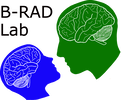Brain Research Across Development (B-RAD) LabThe B-RAD Lab is directed by Dr. Caitlin Hudac, faculty at the University of South Carolina Department of Psychology.
|
What do we study?
- Understanding the social brain: Our research aims to understand how the brain changes as infants, children, and adults learn about the world. We primarily focus on the development of the social brain, including basic processes (e.g., social attention, intrinsic social motivation) and higher-ordered social cognition (e.g., understanding goal-oriented behavior, reasoning about others).
- Neurotypical and neurodiverse development - dynamic (moment-to-moment) and long-term changes: We work with neurotypical populations to better understand these mechanisms with an emphasis on how the social brain responds dynamically. In addition, we work to identify "biomarkers" that may be critical for generating targeted treatments for individuals with neurodiverse development, such as autism spectrum disorder (ASD) and intellectual disability (ID). We aim to identify unique subgroups by examining patterns across multiple biomarkers -- for instance, subgroups based upon genetic etiology or based upon behavioral profile.
- Addressing disparities: We investigate brain development in populations that are historically underrepresented in research, including rural and minoritized populations (e.g., racial groups, lower resourced areas). Several of our projects directly tackle this aim: for instance, we have a few upcoming papers that describe how we execute EEG studies off-site to be more inclusive to families that have travel limitations (see recent papers: rurality and ASD treatment and off-site EEG testing on emotion regulation with a predominantly Black/African-American participants). More broadly, we are committed to overcoming traditional barriers to participation through community engagement together with our colleagues, as well as creative solutions to reduce burden on families (e.g., researchers travel to complete EEG testing using portable equipment).
